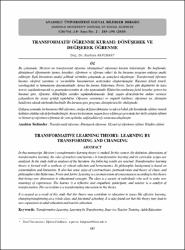| dc.contributor.author | Akpınar, Burhan | |
| dc.date.accessioned | 2014-08-02T14:42:00Z | |
| dc.date.available | 2014-08-02T14:42:00Z | |
| dc.date.issued | 2010 | |
| dc.identifier.issn | 13030876 | |
| dc.identifier.uri | https://hdl.handle.net/11421/374 | |
| dc.description.abstract | Bu çalışmada, Mezirow’ un transformatif öğrenme (dönüşümsel öğrenme) kuramı irdelenmiştir. Bu bağlamda,
dönüşümsel öğrenmenin tanımı, boyutları, öğretmen ve öğrenen rolleri ile bu kuramın program anlayışı analiz
edilmiştir. İlgili literatürün analizi şeklinde yürütülen çalışmada şu sonuçlara ulaşılmıştır: Transformatif öğrenme
kuramı, eleştirel yansıtma ve yorum bilim kuramlarının sentezinden oluşturulmuştur. Kuramın felsefi temeli,
varoluşçuluk ve hümanizme dayanmaktadır. Ayrıca bu kuram, Habermas, Freire, Sartre gibi düşünürler ile kaos
teorisi, yapılandırmacılık ve postmodernizmden de izler taşımaktadır. Eğitim kavramlarına farklı boyutlar getiren bu
kurama göre, öğrenme, bilinçliliğin yeniden yapılandırılmasıdır. Sınıf, yaşam deneyimlerine anlam vermeye
çalışanların bir araya geldiği topluluktur. Öğrenen, yansıtmacı ve empatik katılımcı; öğretmen ise, dönüşüm
katalizörü olarak nitelendirilmektedir. Bu kurama göre program, dönüştürücü bir etkileşimdir.
Çalışma sonunda, bu kuramın etkili öğrenme,sınıfça değişme/dönüşme ve işlevsel okul gibi konularda eğitime önemli
katkıları olabileceği değerlendirilmiştir.Ayrıca bu kuramın, yaşam boyu eğitim çerçevesinde her türlü yetişkin eğitimi
ve hizmet-içi öğretmen eğitimine de yeni açılımlar sağlayabileceği sonucuna ulaşılmıştır. | en_US |
| dc.description.abstract | In this manuscript,Mezirow’s transformative learning theory is studied. In this context, the definition, dimensions of
transformative learning, the roles of teachers and learners in transformative learning and its curricular scopes are
analyzed. In the study held as analyses of the literature, the following results are reached: Transformative learning
theory is formed with a synthesis of critical reflection and hermeneutics. Its philosophic background is based on
existentialism and humanism. It also has some signs of constructivism, postmodernism and theory of chaos, and
philosophers like Habermas, Freire and Sartre.Learningisareconstructionofconsciousnessaccordingtothistheory
that brings new dimensions to educational concepts. The class is a society of individuals who seek to make new
meanings of experiences. The learner is a reflective and empathetic participant; and teacher is a catalyst of
transformation. The curriculum is a transformating interaction in this theory.
It is argued as a result of this study that this theory may contribute to education in issues like effective learning,
changing/transforming as a whole class, and functional schooling. It is also found out that this theory may lead to
new expansions in adult education and teacher education. | en_US |
| dc.language.iso | tur | en_US |
| dc.publisher | Anadolu Üniversitesi | en_US |
| dc.rights | info:eu-repo/semantics/openAccess | en_US |
| dc.subject | Transformatif Öğrenme | en_US |
| dc.subject | Dönüşerek Öğrenme | en_US |
| dc.subject | Hizmet-İçi Öğretmen Eğitimi | en_US |
| dc.subject | Yetişkin Eğitimi | en_US |
| dc.subject | Transformative Learning | en_US |
| dc.subject | Learning By Transforming | en_US |
| dc.subject | Inservice Teacher Training | en_US |
| dc.subject | Adult Education | en_US |
| dc.title | Transformatif Öğrenme Kuramı: Dönüşerek Ve Değişerek Öğrenme | en_US |
| dc.title.alternative | Transformatıve Learning Theory: Learning By Transforming And Changing | en_US |
| dc.type | article | en_US |
| dc.relation.journal | Anadolu Üniversitesi Sosyal Bilimler Dergisi | en_US |
| dc.relation.publicationcategory | Makale - Uluslararası Hakemli Dergi - Kategorisiz | en_US |


















